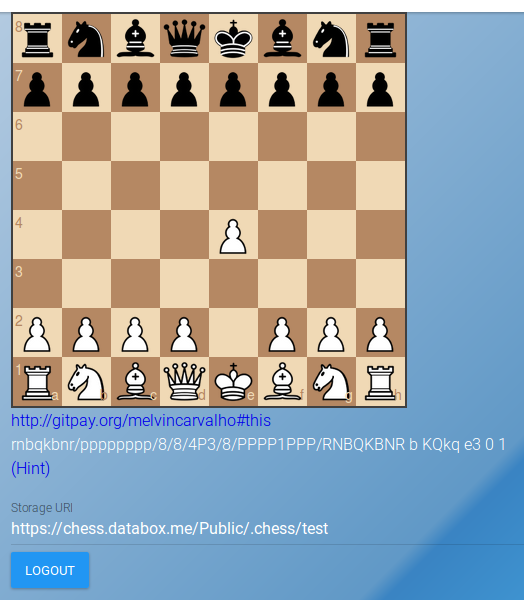Chapter 5 - Solid Chess

Introduction
In this tutorial we will cover how to play a game of chess in reatlime using Solid and Websockets updates. A JavaScript board is embedded in the page, updates occur in realtime, and a link is provided to a chess engine to enable hints.
What you will learn
- How to add Websockets support
- How to send moves to a Pod in realtime
- How to update the board when a new move is made remotely
- How to create your own vocabulary
- How to embed a JavaScript chess widget in a page
- How to link to a chess engine for hints
The App
The main aspect of this tutorial is realtime updates via websockets. Solid uses a pub/sub mechanism to allow users to subscribe to a resource, and will send pub updates when one of those resources changes.
Websockets are built into the browser and are started using the
new WebSocket(uri)
syntax. After opening the websocket we then have access to the onopen, onclose, onerror and onmessage functions. When a socket closes or errors, we would like to restart it so we will call a restart function.
socket.onerror = function(){
console.log('socket error');
setTimeout(connect, RECONNECT);
};
After a socket has been opened we will send a subscription to a resource:
socket.onopen = function(){
console.log(sub);
$scope.socket = socket;
socket.send('sub ' + sub, socket);
if (!quiet) {
setInterval(function() { socket.send('ping'); }, INTERVAL);
}
};
Additionally some web servers silently time out if not periodically pinged so we send a ping message every 4 minutes. If we get a message we check for the 'pub' command and if found we will fire a callback for further processing.
socket.onmessage = function(msg) {
var a = msg.data.split(' ');
if (a[0] !== 'pub') return;
processSocket(a[1]);
};
When we get a message the server will tell us which resource updated. So we can now drop the cache, notify the user and fetch the resource again.
function processSocket(uri) {
$scope.invalidate(uri);
$scope.fetchBoard();
$scope.audio.play();
}
More Coming soon ...